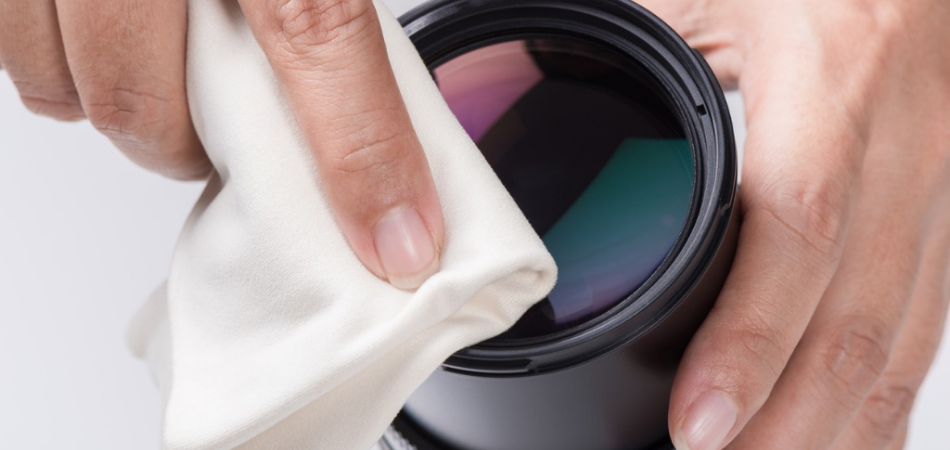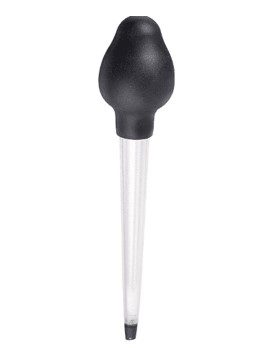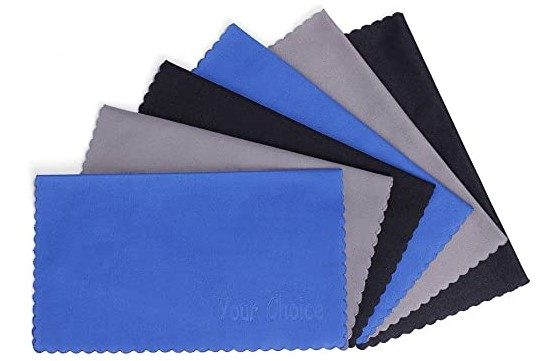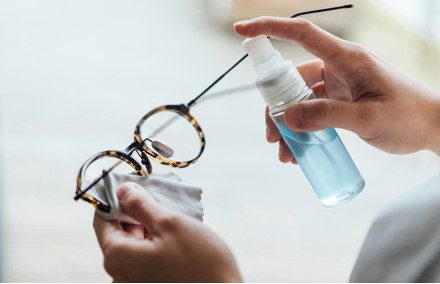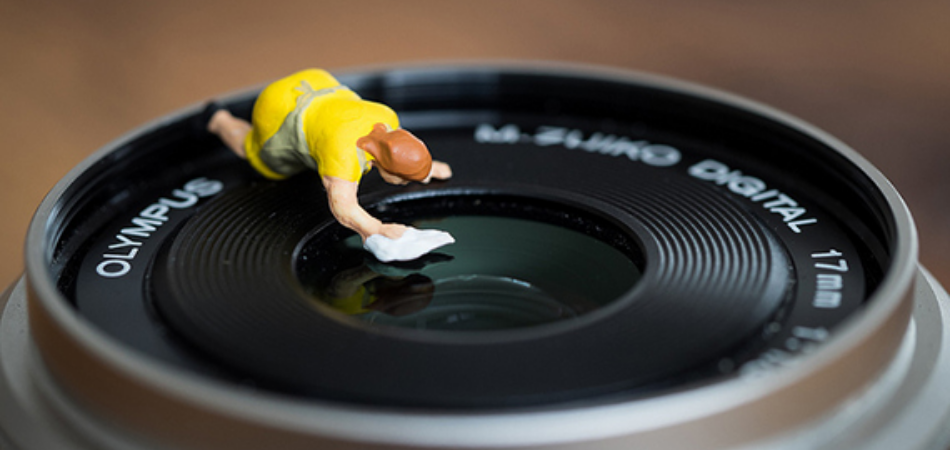There can be times when you might run out of the lens cleaner for cleaning the camera lens or simply don’t have it. Then how do you do it?
The best way to clean a camera lens without a lens cleaner is with your breath and a microfiber cloth. Unlike sunglasses, you can’t simply rub the tail of your shirt across your camera lens without keeping it from permanent scratches.
When your camera lens is dirty, it’s like you’re looking through a dirty window. The image quality can be ruined by something as small as a speck of dirt particle or an almost invisible tiny drop of rain.
Let’s show you how to clean camera lens without lens cleaner, which can save you from a great deal of trouble in an instant.
How Often Should You Clean Your Camera Lens?
The frequency of cleaning the camera lens depends on is how often and where you take photos.
If you shoot frequently at a beach using your Nikon d90 camera (for example) where sands and dust are present, you may need to clean your lens after each shot. The camera sensor gets exposed to dirt there more often than if you shot inside a studio.
Well, if that’s the model you’re using, in particular, having a spare lens for Nikon d90 camera can help you keep on shooting without cleaning.
What Household Item Can You Use to Clean Your Camera Lens?
If you’re in a hurry but don’t have a lens cleaner, there are a few household items that can come in handy. You probably already have most of the items below in your place, so it’s very cost-effective!
A Turkey Baster
Turkey basters feature a large rubber ball on top that can be squeezed to blow air out a thin nozzle. This air blower does not have as powerful of an air blast, but it works well for removing the initial dust particles.
First and foremost, clean your lens of any dirt or debris. The reason for this is that small amounts of dust can scratch the lens coating when it’s rubbed. You should blow away any big debris first before you clean the lens to ensure all of these are gone.
The most common method is to use a lens puffer, but a turkey baster will suffice too.
A Microfiber Cloth
In addition to lens care, microfiber cloths are useful for a number of other purposes. Your eyeglasses, your watch collection, your computer screen, even your dishes, can all be cleaned with one!
The fabric in microfiber cloths is made from tiny strands, which are thinner than silk strands. The high number of tiny fibers makes the cloth extremely porous, but at the same time delicate and soft. When it comes to camera lenses, microfiber cloths are effective in removing moisture as well as dirt and oil.
Microfiber cloths are best used for removing finger smudges on the lens. Considering how many fine strands of fabric are in the cloth, you can easily break up and lift these difficult-to-clean oil spots.
Eyeglasses Cleaner
It goes without saying that the best way to remove the toughest smudges and dirt spots is to use a lens cleaner. But, let’s be honest, someone in your house has glasses, and where there are glasses, there’s lens cleaner too!
Lens cleaner, like eyeglass cleaner, is a simple alcohol solution that allows lenses to be cleaned. You can use it on your camera safely. And it does a remarkable job cleaning.
Use Your Breath
For the sake of this article, I’m placing your respiratory system into the same category as household items. You know, we all have one!
Without a cleaning solution, using your breath is an excellent solution to clean camera lenses without a kit. Exhaling onto the lens builds up condensation, which is how it works. When this condensation forms on your lens, it breaks up dirt and grime, making it easy to wipe away.
No matter how archaic this might sound, this is a trick that all photographers use. Particularly when you travel or hike, you do not always have the right lens cleaning kit with you.
But you do always have your precious lungs, right?!
Get to Know: How to Remove Scratch from Camera Lens?
How to Clean Camera Lens without Lens Cleaner?
Now that you have all the necessary household cleaning items, let’s take a look at the step-by-step cleaning procedure of the best way to clean a camera lens.
Step 1: Blow Away Any Dust
Make sure your lens is clean and free of dust particles before you touch it. Point the nozzle of the turkey baster at the camera lens, but do not actually touch it. Use the baster several times to blow air on the lens and remove any noticeable debris.
You might be tempted to skip this step and blow dust away with your mouth instead. But unfortunately, that won’t work because you might accumulate saliva on the lens and will cause you more work down the line.
Therefore, simply use the turkey baster, and you will not have to worry about anything.
Step 2: Use A Lens Cleaning Solution
If you want to wipe the lens, you must clean it of dirt and oil. Having said that, the best way to accomplish this is with alcohol-based cleaning solutions, eye-glass cleaner, for instance, or by using your breath. While proper cleaning solutions will likely lift tough stains faster, your breath will also help.
Spray your microfiber cloth twice or thrice with a cleaning solution if you use one. If possible, dampen the cloth as much as possible, without letting it drip.
The breath option can be used to fog glass by gently exhaling on it. This may need to be done several times during the cleaning process.
Step 3: Wipe Using a Microfiber Cloth
From the middle of your lens body, wipe it in a circular motion. In this case, the idea is to start with a cleansing wipe in the center and gradually work outwards. By using this method, you can clean any trouble areas thoroughly and cover the lens completely. A wider brush would result in more lens streaking that would be more difficult to clean.
If you’re wiping oil spots from the lens, keep pressing gently on the glass with the cloth. You will feel like you’re wiping away things, but not so much that you can feel to the hand. When oil spots are wiped firmly and consistently, they disappear quickly.
Tips To Keep Your Camera Lens Clean Longer
It is given that our lenses and gear will get dirty and will need to be cleaned. With proper lens care, we can prolong the time between cleanings as much as possible. You should use a lens filter, properly store and switch out your lenses, as well as trying to stay away from touching the optics, no matter how clean you believe your hands are.
If you use a blower, brush, lens tissue, facial tissue or cloth to wipe your lens surface, and liquid to clean it, you should be able to get rid of maximum of the dust and smudge problems. To avoid costly lens damage, you should consult with a professional for solving any complicated lens problems.
Alternatively, you can use a mail-in sensor cleaning service if the problem does not appear to be on the lens, but rather on the sensor. Do not attempt to perform this service at home because the glass on lenses is too tough to self-service, while the sensors are susceptible to scratches and can attract dust.
The Bottom Line
There you have it, the guide on how to clean camera lens without lens cleaner, only using commonly available household items. You can follow the methods without having to go to the store. Instead, now you have everything you need for spotless lenses within your reach!
However, it’s a good idea to strike a balance between the above methods and the cleaning methods with a dedicated lens cleaner. When cleaning several items of camera gear at once, you might be better off using actual lens cleaning supplies.

